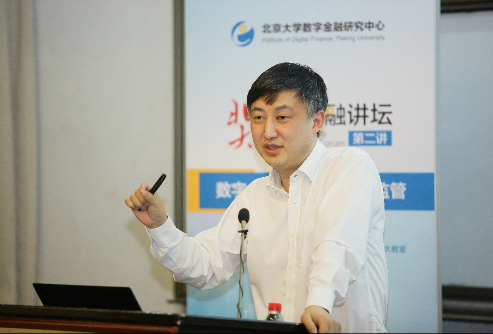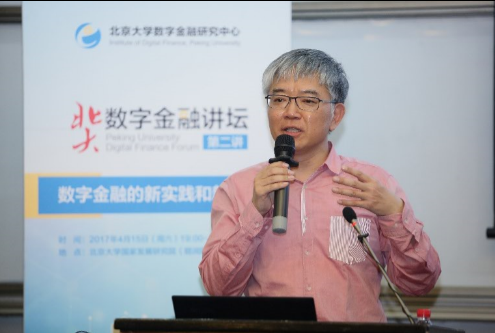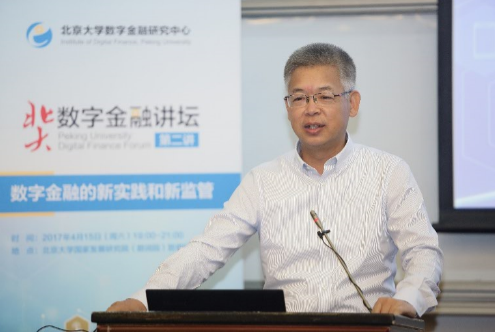The Second Lecture of Peking University Digital Finance Forum ‘New Practices and New Regulations of Digital Finance’
2017-08-22
Along with the development of finance and the progress of science and technology, digital technology has exerted a profound impact on the management mode of traditional commercial banks and financial institutions. Financial technology continues to improve banking and financial technology, but it also brings new risks and challenges. The innovation and promotion of digital technology brings new opportunities and challenges to China’s financial activities and regulatory system. Financial institutions and regulatory bodies are facing the digital transformation brought by the trend of financial technology.
On the night of April 15, 2017, the second lecture of Peking University Digital Finance Forum organized by Institute of Digital Finance (IDF), Peking University was held in Langrun Garden. Two authoritative experts from regulatory department and financial industry were invited to address the lecture. They are: Sun Guofeng, Director of Financial Research Institute and Director of Institute of Internet Finance of the People's Bank of China; Liu Xiaochun, President of China Zheshang Bank (CZB) and Academic Adviser of IDF. On the topic of ‘new practice and new regulation of digital finance’, the two guests made an impressive discussion. Professor Huang Yiping, Vice President of National School of Development (NSD) and Director of Institute of Digital Finance, hosted the lecture.
Dr. Sun discussed the financial technology (FinTech) and regulatory technology (RegTech). He pointed out that FinTech's own financial attributes determine its characteristics of strong risks, which requires effective regulations in the development of FinTech. Besides, Fintech is inherently required to serve the real economy, and the essence of finance defines FinTech's ultimate goal of supporting the development of the real economy by improving the allocation efficiency of financial resources. Later, Dr. Sun introduced the international experience of financial regulations, which can be divided into functional regulation of the United States, as well as the British and Singapore regulatory sandbox model. China's financial market is large and the motivation of micro agents to do financial innovation is strong. In order to highlight the goal of preventing and controlling systematic risks in finance, we should take micro-functional supervision and macro-prudential management as two pillars, while strengthening transnational cooperation. At last, Dr. Sun talked about RegTech. He believes that artificial intelligence is capable of deep learning, and it has a higher level of computing power of global optimization. It may have a unique advantage in preventing systematic risks, and it can solve the problems about the mechanism of incentive and restraint for regulators. China can apply artificial intelligence to financial regulation, using RegTech to deal with FinTech.

Sun Guofeng, Director of Financial Research Institute of the people's Bank of China
President Liu Xiaochun, from the perspective of bank operation and management, discussed the profound impact brought by the digital technology. President Liu said that with the development of digital technology, commercial banks have been subverting the traditional model of operation and management. Specifically, digital technology breaks the boundaries between bank branches, business hours, banks and customers, banks and banks. However, it also varies types of risks, including operational risks. Therefore, commercial banks need to carefully deal with the development of digital technology. Banks and financial institutions need to be clear that digital technology is a tool and a channel to provide services, so companies should use it to increase efficiency and create value for society. Banks should go deep into the market to study the development of economy and society, but also should focus on the design of internal technical process. In the meanwhile, they should pay attention to the risk management of digital technology, using digital technology to solve financial problems

Liu Xiaochun, President of China Zheshang Bank and Academic Advisers of IDF
At the end of the lecture, Prof. Huang Yiping, Director of IDF, said that the lecture had a professional and detailed analysis of the digital finance development and the improvement of corresponding regulatory measures brought by development of digital technology. He concluded that the development of digital finance in China is worth expectation while the wide application of digital technology goes along with so many risks that digital finance should focus on the study of risk in order to make digital technology serve the allocation of resources better.

Huang Yiping, Vice President of National School of Development (NSD) and Director of IDF